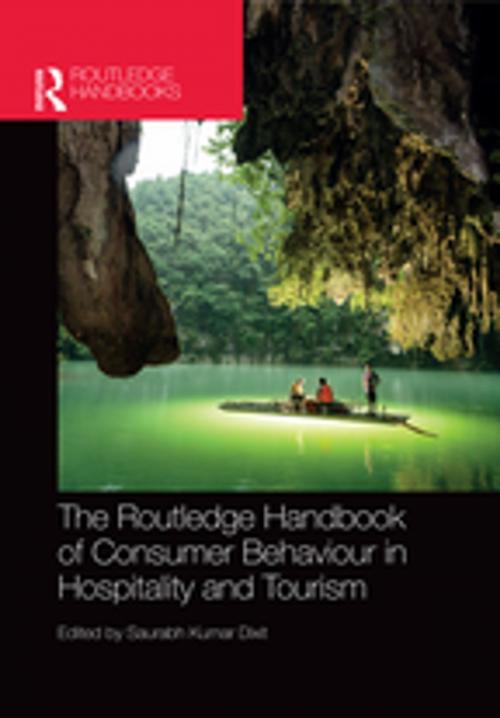The Routledge Handbook of Consumer Behaviour in Hospitality and Tourism
Business & Finance, Industries & Professions, Hospitality, Tourism & Travel, Marketing & Sales, Consumer Behaviour| Author: | ISBN: | 9781317334699 | |
| Publisher: | Taylor and Francis | Publication: | April 7, 2017 |
| Imprint: | Routledge | Language: | English |
| Author: | |
| ISBN: | 9781317334699 |
| Publisher: | Taylor and Francis |
| Publication: | April 7, 2017 |
| Imprint: | Routledge |
| Language: | English |
Consumer behaviour is one of the most explored topics in tourism and hospitality marketing, interchangeably denoted by the terms ‘traveller behaviour’, ‘tourist behaviour’ or ‘guest behaviour’. Consumer behaviour acts as an origin for every tourism and hospitality marketing activity. It offers an understanding of why people tend to choose certain products or services and what sort of factors influence them in making their decision. The decision process of buying tourism products or services takes time, because they are mostly intangible in nature due to which there are many risks involved in their buying process.
The Routledge Handbook of Consumer Behaviour in Hospitality and Tourism aims to explore and critically examine current debates, critical reflections of contemporary ideas, controversies and pertinent queries relating to the rapidly expanding discipline of consumer behaviour in hospitality and tourism. The Handbook offers a platform for dialogue across disciplinary and national boundaries and areas of study through its diverse coverage. It is divided into six parts: Part I offers an overview of consumer behaviour; Part II focuses on the service quality perspectives of consumer behaviour; Part III deliberates on customer satisfaction and consumer behaviour linkages; Part IV explores the re-patronage behaviour of consumers; Part V addresses the vital issues concerning online consumer behaviour; and Part VI elaborates upon other emerging paradigms of consumer behaviour. Although there is no dearth of empirical studies on different viewpoints of consumer behaviour, there is a scarcity of literature providing conceptual information. The present Handbook is organised to offer a comprehensive theoretical body of knowledge narrating consumer behaviour, especially for hospitality and tourism businesses and operations. It attempts to fill this research gap by offering a 'globalised' volume comprising chapters organised using both practical and academic approaches.
This Handbook is essential reading for students, researchers and academics of Hospitality as well as those of Tourism, Marketing, International Business and Consumer Behaviour.
Consumer behaviour is one of the most explored topics in tourism and hospitality marketing, interchangeably denoted by the terms ‘traveller behaviour’, ‘tourist behaviour’ or ‘guest behaviour’. Consumer behaviour acts as an origin for every tourism and hospitality marketing activity. It offers an understanding of why people tend to choose certain products or services and what sort of factors influence them in making their decision. The decision process of buying tourism products or services takes time, because they are mostly intangible in nature due to which there are many risks involved in their buying process.
The Routledge Handbook of Consumer Behaviour in Hospitality and Tourism aims to explore and critically examine current debates, critical reflections of contemporary ideas, controversies and pertinent queries relating to the rapidly expanding discipline of consumer behaviour in hospitality and tourism. The Handbook offers a platform for dialogue across disciplinary and national boundaries and areas of study through its diverse coverage. It is divided into six parts: Part I offers an overview of consumer behaviour; Part II focuses on the service quality perspectives of consumer behaviour; Part III deliberates on customer satisfaction and consumer behaviour linkages; Part IV explores the re-patronage behaviour of consumers; Part V addresses the vital issues concerning online consumer behaviour; and Part VI elaborates upon other emerging paradigms of consumer behaviour. Although there is no dearth of empirical studies on different viewpoints of consumer behaviour, there is a scarcity of literature providing conceptual information. The present Handbook is organised to offer a comprehensive theoretical body of knowledge narrating consumer behaviour, especially for hospitality and tourism businesses and operations. It attempts to fill this research gap by offering a 'globalised' volume comprising chapters organised using both practical and academic approaches.
This Handbook is essential reading for students, researchers and academics of Hospitality as well as those of Tourism, Marketing, International Business and Consumer Behaviour.















